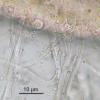
10-02-2026 17:42
 Bernard CLESSE
Bernard CLESSE
Bonjour à toutes et tous,Pourriez-vous me donner

10-02-2026 18:54
Erik Van DijkDoes anyone has an idea what fungus species this m

09-02-2026 20:10
 Lothar Krieglsteiner
Lothar Krieglsteiner
The first 6 tables show surely one species with 2

09-02-2026 14:46
Anna KlosGoedemiddag, Op donderdag 5 februari vonden we ti

02-02-2026 21:46
Margot en Geert VullingsOn a barkless poplar branch, we found hairy discs

07-02-2026 20:30
 Robin Isaksson
Robin Isaksson
Hi!Anyone that have this one and can sen it to me?

25-01-2026 23:23
Hello! I found this species that resembles Delitsc
Nectriella on Typha 1
Hans-Otto Baral,
16-07-2008 17:39
 Hi Christian & Amy and everybody
Hi Christian & Amy and everybodyI promised Amy to collect Hypocreales, here are two on Typha. I collected in a forest pond here in Tübingen dead upright Typha latifolia shoots standing in the water, with the outer sheaths completely dry, and in about 20-40 cm above water level were minute orange dots which I first thought to be orbiliaceous. It was a further surprize that there are two species.
Now, I think one of them must be a Nectriella because the perithecia are permanently subepidermal. There are long thin hyphae around the perithecial wall but no true hairs. Pale yellow oil drops are seen in the wall cells. Interestingly the warts on the spores disappeared in heated KOH. I considered N. paludosa or N. curtisii, mainly because of the substrate. The size of the living spores would well match the data in Rossman & Samuels 1999, but not the size of the dead spores.
Perithecia 120-200 µm diam, subepidermal. Sp. *17-19.5(-21) x 4.3-5.5 µm, distinctly finely & densely warted-punctate, KOH heated 14-17 x (3.5-)3.8-4 µm!, smooth!
Zotto
Hans-Otto Baral,
16-07-2008 17:41
Christian Lechat,
16-07-2008 18:08

Re:Nectriella on Typha 1
Dear friends,
Zotto, maybe it is Nectriella dacrymycella, I studied one collection of this species three years ago, collected by Bruno Coué on Iris.
Can you please send us an image (micro) of Hyphae or hairs ?
Amitiés :)
Zotto, maybe it is Nectriella dacrymycella, I studied one collection of this species three years ago, collected by Bruno Coué on Iris.
Can you please send us an image (micro) of Hyphae or hairs ?
Amitiés :)



